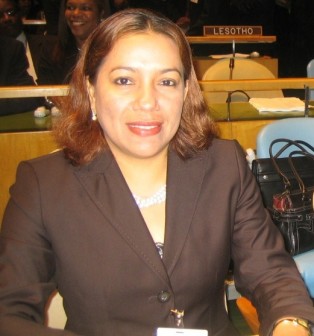The Government of Venezuela yesterday issued a statement in response to Guyana’s submission of a claim to an extended continental shelf, saying it had started to “assess this irregular situation” and was taking the necessary action to preserve the law with respect to its “maritime façade.”
The vital interests of the country would be defended in a resolute manner by means of internationally established mechanisms for dialogue, the release continued, reiterating the Venezuelan government’s commitment to the Good Offices Process of the United Nations Secretary General.
On September 6, Guyana submitted a claim to an extended continental shelf to the Commission on Limits of the Continental Shelf under the UN Convention on the Law of the Sea (UNCLOS). According to the Venezuelan government, Guyana’s Ministry of Foreign Affairs gave them official notification of the submission the following day.

In a press release on September 7, Foreign Minister Carolyn Rodrigues-Birkett had said: “I wish to make it clear that Guyana’s submission of a claim to an extended continental shelf has been made without any prejudice to any future delimitation of maritime boundaries with neighbouring States; Barbados, Suriname and Trinidad and Tobago.”
Efforts to contact Rodrigues-Birkett yesterday were unsuccessful.
The Venezuelan statement yesterday said: “The Bolivarian Government of Venezuela, acting responsibly, has begun to evaluate this irregular situation [Guyana’s claim to an extended continental shelf] in order to give a proper response in the context of International Law and is taking the necessary action to preserve the law in respect of its maritime façade.”
The Venezuelan government noted that its statement did not seek to prejudge the issues relating to the determination of the maritime boundary between Venezuela and Guyana, but expressed its concern that the Government of the Cooperative Republic of Guyana had not previously informed Caracas about its submission to UNCLOS, despite the fact that avenues of communication were available, such as the Good Officer or the bilateral commissions.
It went on to say that the Venezuelan government had “developed from day one, a foreign policy based on the defence of the sacred interests of the motherland, at the same time consolidating friendship and solidarity with the Latin American and Caribbean peoples and with special emphasis on the Co-operative Republic of Guyana, a country with which there is a territorial controversy inherited from the old colony.”
The release made reference to President Hugo Chávez, who it said had implemented the correct policy of peace, sovereignty and respect for international law in relation to Guyana. This was in contrast it went on,
to the old warlike attitude and threats from the Venezuelan bourgeoisie, “whose only objective was to provoke the progressive governments of the sister republic in conformity with the designs of the centres of imperial power.”
The Venezuelan government, the release said, “rejects the campaign of intrigue that the Venezuelan bourgeoisie has unleashed by means of its propaganda and political parties which seek to manipulate the Venezuelan people who are uninformed about such a sensitive topic… that bourgeoisie is subject to the mandates of Washington and is financed with money from the empire.”
In conclusion, the Venezuelan government expressed “its maximum willingness” to build constructive relations with Guyana, but confirmed it would continue to defend the “vital interests of the country in the most resolute way through internationally established dialogue mechanisms. In this regard it reiterates its commitment to the process of the Good Offices of the United Nations Secretary General.”




